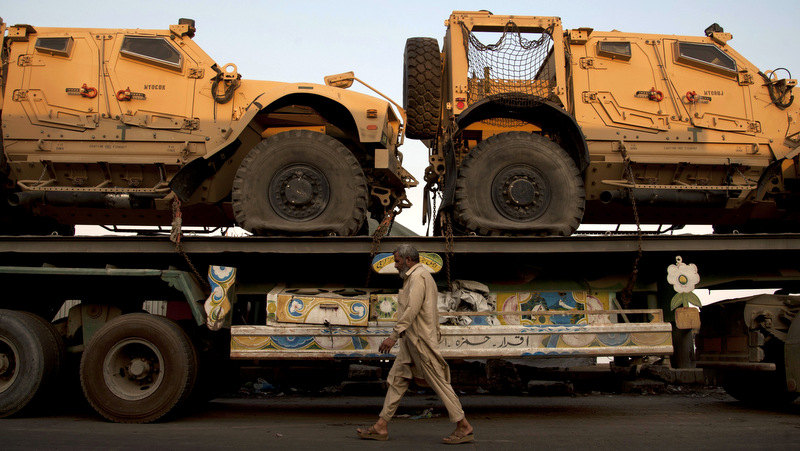 A Pakistani man walks by a truck carrying military vehicles at a terminal in Karachi, Pakistan. U.S. officials, are frustrated with growing fraud and corruption plaguing the U.S. Military. including the more than $1 billion the U.S. paid in additional fees to fly American military equipment back to the U.S. after trucks carrying the equipment through Pakistan were halted by Anti-American military protests. (AP Photo)
A Pakistani man walks by a truck carrying military vehicles at a terminal in Karachi, Pakistan. U.S. officials, are frustrated with growing fraud and corruption plaguing the U.S. Military. including the more than $1 billion the U.S. paid in additional fees to fly American military equipment back to the U.S. after trucks carrying the equipment through Pakistan were halted by Anti-American military protests. (AP Photo)
America’s massive military-industrial complex is a huge profit-making enterprise for hundreds of corporations, with trillions of dollars spent on the wars in Afghanistan and Iraq. Now, a new report on U.S. Army corruption shows that millions have been stolen through fraud and corruption in those countries. It also suggests the problem may be poised to become even worse.
The report, released Tuesday by the Center For Public Integrity and co-published by Slate, highlights crimes committed in Iraq and Afghanistan. Valued at an estimated $50 million, the crimes run the gamut from bribery and contract corruption to fuel theft. At least 115 enlisted Army personnel have been convicted since 2005, with hundreds more cases pending in military courts or under investigation.
Despite the prosecutions, the root causes of the corruption have not changed, according to the report. It states:
“Many of these crimes grew out of shortcomings in the military’s management of the deployments that experts say are still present: A heavy dependence on cash transactions, a hasty award process for high-value contracts, loose and harried oversight within the ranks, and a regional culture of corruption that proved seductive to the American troops transplanted there.”
Individual cases highlighted by the center show that theft and corruption were so widespread in Iraq and Afghanistan, soldiers often believed it was impossible to get caught. Poorly monitored fuel shipments, paid for in cash and badly tracked, allowed valuable resources to be diverted into the pockets of enlisted personnel and their allies.
In the largest conviction documented, Army Maj. John Cockerham received 17-and-a-half years in prison for a complex contract fraud scheme that grew to involve two other officers, who were also convicted. By the time the scheme was exposed, the group had received over $14 million in bribes in return for awarding military contracts for goods like bottled water.
A 2011 investigation from Talking Points Memo’s Muckraker points out that the military knew about fuel theft in Afghanistan since at least 2009, yet the problem persisted throughout the following years. A major fuel theft ring was still operating in March 2010, with the first convictions taking until 2012.
The cases the military knows about are just a fraction of the pervasive corruption officials suspect is occurring. John F. Sopko, Special Inspector General for Afghanistan Reconstruction, told the center, “his agency has probably uncovered less than half of the fraud committed by members of the military in Afghanistan.”
“You don’t appreciate how much money is being stolen in Afghanistan until you go over there,” Sopko says in the report.
The problem could grow worse, too, as military reconstruction funds flow into both countries and thousands of army personnel return to Iraq to aid the fight against the Islamic State of Iraq and Syria (ISIS) as budgets for fighting corruption are simultaneously shrinking. The report notes:
“Auditors working for Sopko’s agency face increasing restrictions in Afghanistan … so that the U.S. government can provide them ‘adequate security and rapid emergency medical support,’ according to a report Sopko’s agency issued in 2013. As a result, in 2014, Sopko’s investigators were only able to access one-fifth of the country.
Moreover, because the U.S. embassy in Kabul is shrinking, Sopko has been instructed by the State Department to cut his staff there by 40 percent, to just 25 positions, by mid-2016 — a dictum he says will hamper his ability to monitor wrongdoing by federal personnel. Everyone in Afghanistan, including his on-the-ground investigators, Sopko wrote in his agency’s report, will struggle over the next few years ‘to continue providing the direct U.S. civilian oversight that is needed in Afghanistan.”
Speaking at the Houston Peace and Justice Center in April, anti-war activist David Swanson wondered what else could be purchased with the billions spent on war.
“For tens of billions of dollars the world could end starvation, unclean drinking water, and various health problems; it could invest in green energy and sustainable agriculture and education in massive, undreamed of ways,” he suggested.
Instead, it seems the expanding role of the U.S. military profits everyone but those killed by U.S. bombs.

